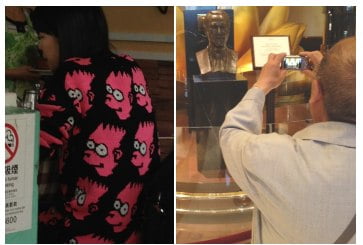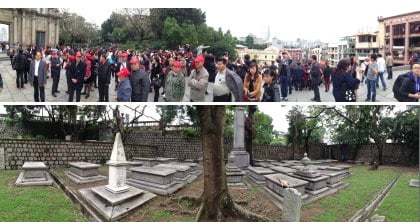After dragging out the inevitable, the Hong Kong government finally abandons its plan to allow company directors to conceal their ID card numbers – and thus, in many potential cases, their true identities.
It takes a lot to get Hong Kong government officials to admit that they have made a stupid mistake. And when, after exploring all other avenues, they climb down, it is almost too painful to watch as they laboriously and self-consciously attempt to appear not to be climbing down – even though we know, and they know we know – that they are. In the Hong Kong context, the citing of a ‘lack of consensus’ is the last refuge of a policy-making scoundrel.
You almost feel a twinge of sympathy. Well, OK, you don’t. In a manlier culture of governance, someone would say “Yes, I screwed up,” and resign. Here, the humiliated error-makers will be eating bitterness for years to come.
Among the guilty are the Privacy Commission, which, perhaps in a fit of empire-building, seems to have encouraged the notion that ID card numbers are private – the exact opposite of their true purpose of specifying which Chan Kwok-hung, John Smith or Zeng/Tsang Xiaofeng/Siu-fong someone is. We can also point the finger at Financial Services and Treasury Bureau officials, and ask whether at some stage their determination to push the measure through was influenced by Beijing, where leaders have been humiliated by revelations about their families’ accumulation of vast, sometimes Hong Kong-registered, wealth. We can also blame legislators; those representing business interests had their own predictably murky motives to support the proposal, but those supposedly representing the people too easily swallowed the ‘privacy’ argument.
It wasn’t widespread public opposition that forced the government to backtrack, but objections from experts, many in the financial services sector, unaccustomed to criticizing official policy. The attention of the international media did the rest.
The subject of the next government climbdown is likely to be altogether more populist, and that’s the proposal to issue a licence for a new 3G mobile operator. Cynics assume that Mainland state telecoms giant China Mobile is behind this – using its influence in Beijing to bully Hong Kong officials into letting it directly own a chunk of limited local spectrum.
Critics (including vested interests) claim this would slow mobile Internet speeds by 30%; government officials themselves admit that the figure would be 18%, which is a noticeable deterioration in service quality, and a flabbergasting thing to admit. Both sides also agree that the telecoms sector already has sufficient competition. In short, the government, or at least civil servant Susie Ho, is virtually arguing against its own proposal.
This suggests that China Mobile (assuming it is behind an attempted high-tech land-grab) will be repelled, and at least some local officials are in fact working to that end. As in the Mainland oil industry, there are three big telecoms operators (Mobile, China Unicom and China Telecom) with varying degrees of influence among different factions, ministries, maybe the PLA, maybe princelings and so on. Hong Kong authorities are not necessarily under any pressure to kowtow to this particular company, state-owned or not. One of our officials will just have to say, “Sorry China Mobile, we tried our hardest to help you out, but as you can see our political and regulatory structures just won’t allow us to hand you a slice of this pie.”
I mean, can you seriously imagine the Hong Kong government genuinely trying to increase competition in part of our domestic economy?
Conspiracy theorists looking for similar cases where officials somewhere in the bureaucracy have sabotaged policy will find plenty of possible examples. Among the biggest would be Article 23 and National Education, both of which would have had far better chances of implementation had they not been so mysteriously badly handled (that is mis-handled in an abnormal – rather than the usual – way).
Anyone despairing of the quality of governance and more in Hong Kong can always seek relief through a weekend in Macau, perhaps to inspect: the latest design in ladies’ wear; and rumours that Mainlander tourists are avidly taking photographs of a bust of casino mogul Stanley Ho (the shall-we-say flattering likeness is placed next to a far less appealing work he ‘rescued’ for the nation from evil foreign thieves)… 
…work on the city’s new super-max prison, being built not far from the (apparently extremely grotty) current facility on Coloane Island, on a hilltop, with multiple watchtowers in rather close proximity to the airport, but I’m sure they know what they’re doing…
…whether plentiful visitors are still enjoying the local sights (yes); and whether there are any new additions to the Anglican cemetery (no, not since 1977 so far as I could see)… 

You are very brave to go to Macao. It’s a nightmare. Must be the ugliest city in the world. Makes Tsuen Wan look planned and Las Vegaslook tasteful.
It’s Hong Kong climb-ups you have to watch. So much social climbing these days, brown nosing and little miniature Peking dogs being released from their kennels to yap in public when they hear the bell of the Liaison Office.
Down, boy, down girl, down!
Oh, I see some horrible blogger has compiled a list of the Ten Worst Hong Kong English Blogs. Impertinence!
“In manlier culture of governance, someone would say “Yes, I screwed up,” and resign.”
…and in a more intellegent culture the objections would have been clearly foreseen and the initiative never proposed.
Loved the SCMP bit (was it ‘Lai See’?) about the announcement being timed a few hours before a public holiday and hidden among a mass of govermentspeak. So predictable … so HK government.
@ darovia
Yes I also loved the Lai See take on this. Howard Winn, with his usual dry sense of humor, pointed out that the actual climb down statement per se was at the bottom of page 10 of a 10-page govt blurb-announcement.
Reminds me of “Yes Minister” .
Why on earth can’t HK civil servants behave like normal HK staff (at least the staff my company employs ) ?
Their – and my attitude to a screw-up is very simple:
1. own up ( and the sooner one do it the better)
2. openly clear up the mess caused my the screw-up
3. make sure it doesn’t happen again
And a tip of the hat to Mr Webb for his shining a light on the company director ID number fiasco. I hope he’ll now re-post all that info on his webb-site.com for easy browsing.
Dear Bela, Tsuen Wan was planned! Just badly. As regard the Government announcement, they were likely waiting for North Korea to invade the South or for a plane crash to distract the public, but time ran out.
Bela, Fine blog at NTSCMP! Let’s see if RTP can do half as well.
Dream Bear
Like Tuen Mun, Tsuen Wan is a town without a centre and must have been designed by the same people that did Birmingham.
PD
Thank you so much.
There’s a blogger in everyone dying to get out. Hong Kong needs more expressed opinions, more righteous venom and more resistance.
@ PD
I decline to respond on the grounds that it may incriminate me (and also, because I am actually beginning to find Bela’s contributions rather amusing from time to time * : note that I said amusing, not necessarily sensible)
* Note to self : need sanity check
But in a belated afterthought to last Thursday 28 March late -breaking hilarious news announced in a recent article published on a website run by the China’s own Ministry of Industry and Information Technology, which I posted that late evening on the BL :
“Myanmar recently unblocked the popular social networking site Facebook, which means only four countries in the world still ban the website: North Korea, Cuba, Iran …and another country”
This brought back memories all weekend of “I vow to thee my country”, the tune of which has now been adopted for the much better cause of the World Rugby Union than British jingoism.
So to paraphrase the 3rd stanza:
And there’s another country, I’ve heard of long ago,
Most dear to them that love her, most great to them that know;
We may not count her armies, we may not Xi Jinping;
Her fortress is the internet great wall, her pride is suffering;
And soul by soul her borders in the China Seas increase,
And her ways are ways to all suppress who challenge party peace.
“Another country”? Wasn’t that a flick about the love that dares not speak its name manifesting itself at an interwar public school?
Bela may consider Macau “the ugliest city in the world”, and perhaps some of its newer parts deserve that description. Personally I consider its preserved Portuguese colonial buildings an excellent example of what Hong Kong could do with its few remaining historic buildings if our government had any imagination and the balls to oppose the property interests that want to demolish and replace anything more than 20 years old.